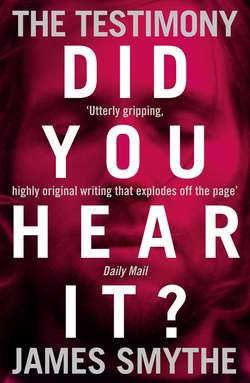Читать книгу The Testimony - James Smythe, James Smythe - Страница 20
Elijah Said, prisoner on Death Row, Chicago
ОглавлениеI was asleep when I first heard the static, in my cot. They called them cots, like we were babies. Lots of people in there didn’t sleep, defiantly staying awake, rattling anything they could against the bars, or howling their way through the nights. They would try to make sure that nobody could forget who they were, or where they were. I am a murderer, their actions called out, you would do well to remember who it is that I am, what I am capable of. It is within me to commit horrors upon you, and for that reason, I do not sleep when you tell me to; I sleep on my own timescale. On the corridor, we didn’t get exercise like the rest, didn’t get library time. Our meals were visited upon us, delivered on trays, always hot, always neatly plated, our cutlery thin shards of blunt plastic that was counted back when we were finished with our meals. If we tried anything – and I did not, but I watched as others did, unrepentant in their drive for freedom, or revenge – the cutlery was removed completely, and the prisoner ate with their hands, like a primate, free yet ignorant. The guards would laugh as they spooned potato into their mouths, with the gravy dripping through their fingers; that’s your punishment, they would say. No, I say: their punishment was both being there in the first place, behind those bars; and also would be delivered by Allah upon their death, a death that they entirely deserved for the crimes that they had committed toward their fellow man. They howled in the nights, dogs, desperate for their creator to put them out of their misery.
I could sleep through the catcalling, the constant abuse; but when a noise was unknown it would rouse me from even the deepest sleep. The static had us all on our feet, demanding to know what was happening. The guards ignored us, and left us alone. That was the first time I could remember the corridor being left unguarded; no matter how loud the shouts came for the next few minutes, the guards didn’t return, and we were briefly free from their watch to do as we pleased within those confines; for my part, I was on my musalla, praying.
The guards returned after a few minutes, when I was still praying, and they put the lights on along the corridor, demanded that we turn out. They were on edge, frantic as mice. As always, I stood back, allowed them into my cell. As always, they invaded my privacy, their trust of my people so low that they felt no shame in their intrusions. They searched under my cot, in the metal basin they called a toilet, around my person. They searched my mat, which they were forbidden to do, and they provoked me, prodded me like I was cattle, all to get a reaction. You don’t say much, do you? they asked, and I did not reply: No, I do not.
When they were gone, and the corridor was quiet again – a comparative quiet, a quiet that is still loud with shouting, but constant, our own personal take on the tranquil – my neighbour, a murderer by the name of Finkler, spoke to me. Hey, brother, he said, because he called everybody of colour that name – as if he were saying, I am one of you, the oppressed, the downtrodden, we are in this together – you know what that was? No, I replied. He carried on, even though the lights were now out, and the guards demanded silence from us: What d’you reckon it was, then? Allah will deliver answers, I said. He went quiet. Even in here he knew I could still kill him, if he didn’t go at the hands of the state first.
